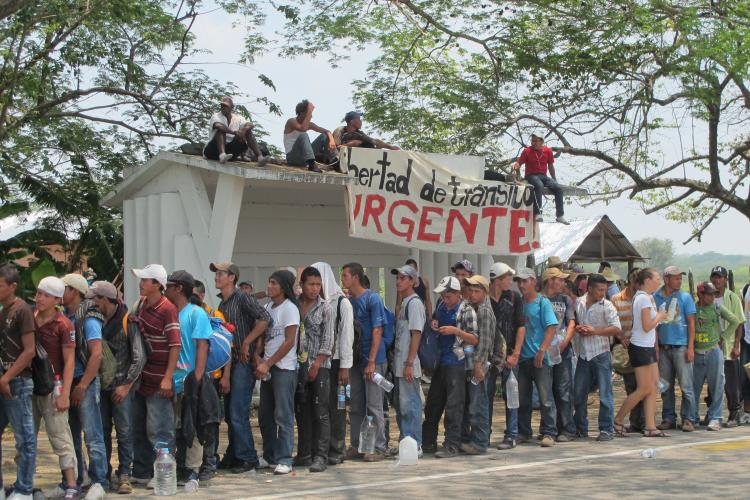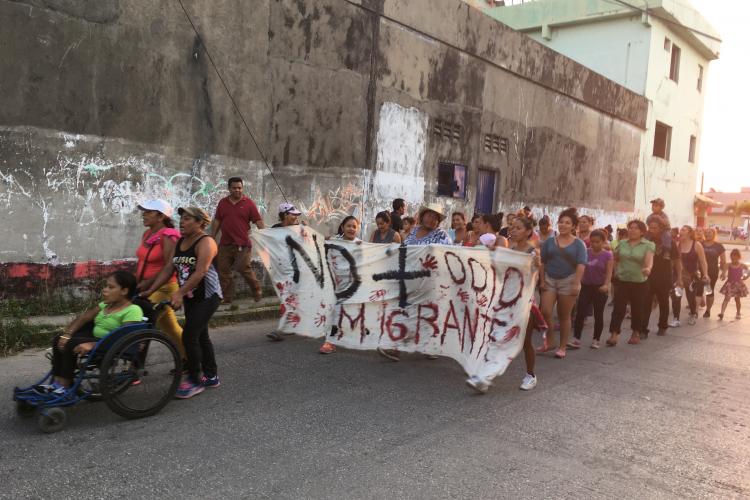AMLO’s Political Prisoners: Mexico’s Move to Criminalize Accompaniment and Solidarity with Migrants in Transit
Posted:
Time to read:
Guest post by Amelia Frank-Vitale, Wendy Vogt, and Martha Balaguera. Amelia is a doctoral candidate in Anthropology at the University of Michigan. Her current project documents how Honduran deportees reconfigure their lives and reimagine their futures after being returned to some of the world’s most dangerous neighborhoods. Wendy is Associate Professor of Anthropology at Indiana University-Purdue University, Indianapolis and the author of the book Lives in Transit: Violence and Intimacy on the Migrant Journey (UC Press, 2018). Martha is Assistant Professor of Political Science at the University of Toronto. Her book manuscript (in progress) foregrounds forms of transnational solidarity in the Mesoamerican migration circuit, including the practice of accompaniment.
In 2012, more than a thousand migrants primarily from the Central American countries of Honduras, El Salvador and Guatemala were stranded in the city of Coatzacoalcos in Veracruz, Mexico. The freight trains that the migrants used to cross Mexico in hopes of reaching the United States were out of commission after a railroad bridge collapsed. A week went by, and the numbers of people amassing in Coatza, as it is known colloquially, grew. At the time, the Zetas and the Cartel del Golfo, two drug trafficking organizations, battled in Coatza for control of the migrant routes. Migrants were often the cannon fodder in this struggle; systematically extorted, kidnapped en masse for ransom, murdered to show coyotes who was in charge. As one week stretched into two, a handful of migrants rights’ activists showed up in Coatza to accompany the growing group of people out of the dangerous city beyond the point of the bridge collapse. The small group of activists walked for days alongside migrants (to use the word in Spanish, acompañándolos, or keeping them company), putting their own bodies on the line as they navigated the complex physical and human landscape of Mexican authorities and warring drug cartels. But their act was more than companionship. It was an embodied political action, walking in solidarity with migrants to openly challenge a system of militarization and border enforcement that creates the conditions for violence and exploitation along migrant routes. Two of the people who accompanied migrants during that walk out of Coatza were Mexican activists Cristóbal Sánchez and Irineo Mujica.

Many years later, on June 5, 2019, Irineo and Cristóbal were arrested in Mexico at gunpoint and charged by a federal judge under the new government of Andrés Manuel López Obrador with human smuggling. Irineo and Cristóbal both played prominent roles in the Central American migrant caravans that traveled across Mexico in 2018, prompting political hysteria in the United States in the weeks before the midterm elections. In reality, they had done no more than what they did in 2012 in Veracruz: accompany vulnerable migrants through Mexico. And, although the judge released them because the evidence was insufficient, the investigation is ongoing and the office of the attorney general (Procuraduría) is using language to suggest that accompaniment (acompañamiento) itself is a criminal act.
In the absence of state protection, accompaniment has been a crucial strategy for mitigating human rights violations against migrants and refugees in countries of origin, transit and destination. As a group of academics who have conducted extensive fieldwork along migrant routes in Mexico since 2006, and have both participated in and documented the practice of accompaniment, we see the above case as the most recent example in a much longer trajectory of criminalizing humanitarian aid through the specter of smuggling in Mexico, the United States, and globally. As was revealed during the hearings, the charges of smuggling against Irineo and Cristóbal were unsubstantiated. The migrants who falsely accused them were likely coerced by Mexican authorities, a tactic that has been used in the past. Migrant rights defenders, shelter workers and ordinary people in Mexico have repeatedly been accused of human smuggling and other crimes by local authorities. In 2005, a Mexican woman named Concepción Moreno Arteaga, also known as Doña Concha, spent over two years in prison after feeding migrants passing through her town in the state of Querétaro. Padre Alejandro Solalinde, a priest and founder of the Hermanos en el Camino migrant shelter, was also jailed and accused of smuggling in 2010.
On the other side of the US-Mexico border, people engaged in humanitarian aid efforts in Arizona have been tried for similar crimes. They include the volunteers Shanti Sells and Daniel Strauss in 2005 and geographer Scott Warren, who will be retried later this year, after his previous case ended in a hung jury. Across the Atlantic, German biologist and boat captain Pia Klemp is facing up to 20 years in prison for aiding migrants in the Mediterranean, while Italy has announced plans to heavily fine rescue ships.
Activists across Mexico are decrying the actions of their government. Incoming president López Obrador is, in effect, building Trump’s wall for him by cracking down on Central Americans before they can get anywhere near the US border. Mexican government officials have proven willing to use Central American migration as a bargaining chip for lucrative trade deals and ongoing funding in Mexico’s war on drugs. Immigration enforcement, and the criminalization of those who offer aid and solidarity to migrants, is never just about stopping migration. It is always intimately tied to serving the interests of those who profit off detention and deportation, both economically and politically.
Until now, the rationale behind militarization was always framed in humanitarian terms by the Mexican government. For example, a 2014 initiative, known as Programa Frontera Sur, was implemented with lofty rhetoric about protecting migrants and modernizing its southern border. Under this logic, the government was only trying to protect vulnerable migrants from those who would take advantage of them, namely human smugglers. In line with this public positioning, the government’s approach has thus been to try and delegitimize activists by tagging them as smugglers. However, while government initiatives such as Programa Frontera Sur have only served to further migrants’ vulnerabilities, the need for civil society to actively accompany displaced peoples is more pressing today than ever before, as new policies become obstacles to the right to seek asylum.

Yet, what we are witnessing around the globe is part of the thickening of border regimes and the inward turn to penalize those deemed threats to the nation and state sovereignty. In charging humanitarian workers with smuggling, the state is able to demonize citizens as enemies, traitors even, of the state. Such a view not only overlooks the far more complex realities of smuggling, widely documented in the academic literature, but, most obviously justifies the punishment of those who seek to help.
Many Mexicans had hoped that the new government of Andrés Manuel López Obrador, a self-proclaimed leftist who aligned himself with many of the social movements that had been targeted by previous administrations, would be different. His choice to go after Cristóbal and Irineo on the same day as his head of foreign affairs, Marcelo Ebrard, was negotiating against Donald Trump’s threat of tariffs shows his government to be every bit as willing to appease the United States as earlier administrations. The possibility of criminalizing accompaniment goes beyond his predecessors, however, and is chilling for anyone who thought dissidence would be more tolerated by López Obrador’s government. Cristóbal made this clear after he and Irineo were released from nearly a week in jail. In a press conference, he concluded by saying: ‘we are the first political prisoners of the AMLO administration.’
As academics who have learned from activists like Cristóbal and Irineo and who have worked closely with migrants in transit, we argue that now we must be researchers who also actively accompany. To do so, we embrace an embodied ethics of accompaniment. This means that we must not only oppose policies and enforcement practices that confine migrants to precarity and death, but we must also occupy the contested spaces of mobility with our own bodies. We must commit to being there and walking alongside migrants as politically embodied acts of solidarity and resistance.
Any comments about this post? Get in touch with us! Send us an email, or post a comment here or on Facebook. You can also tweet us.
__________
How to cite this blog post (Harvard style)
Frank-Vitale, A., Vogt, W and Balaguera, M. (2019) AMLO’s Political Prisoners: Mexico’s Move to Criminalize Accompaniment and Solidarity with Migrants in Transit. Available at: https://www.law.ox.ac.uk/research-subject-groups/centre-criminology/centreborder-criminologies/blog/2019/09/amlos-political (Accessed [date])
Share:








